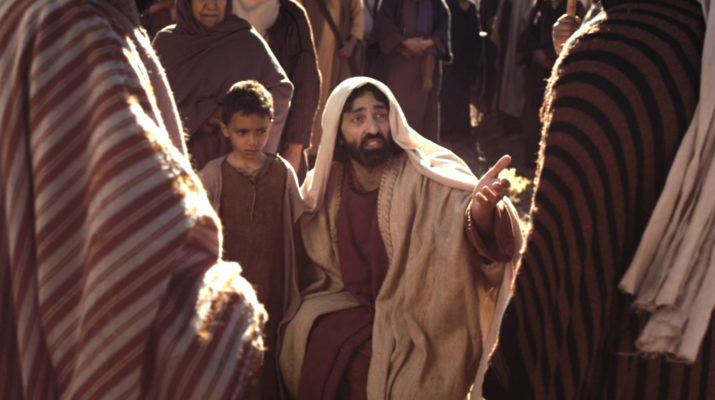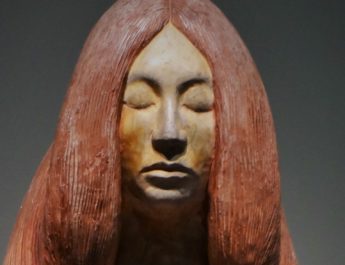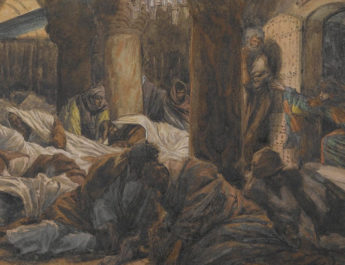Matthew 18:1-9
Narrative Lectionary 130
1 At that timeI the disciplesII cameIII to JesusIV and asked,
I “time” = hora. This is a set time or period, an hour, instant, or season. This is where the word “hour” comes from.
II “disciples” = mathetes. From matheteuo (to make a disciple of); from manthano (to learn key facts, gain knowledge from experience; generally implies reflection as part of the learning process); from math– (thinking things through). This is a disciple, learner, or student. It is where we get “mathematics” from.
III “came” = proserchomai. From pros (for, at, towards) + erchomai (to come, go). This is to approach, draw near, come up to. It is also used figuratively to mean worship.
IV “Jesus” = Iesous. From Hebrew Yehoshua (Joshua, the Lord is salvation); {from YHVH (proper name of the God of Israel; the self-existent and eternal one); {from havah (to become) or from hayah (to come to pass, become, be)} + yasha (to deliver, defend, help, preserve, rescue; properly, to be open, wide or free, which implies being safe. So, in a causative sense, this is to free someone). This is Jesus or Joshua in Greek – the Lord saves or the Lord is salvation.
“Who is the greatestV in the kingdomVI of heaven?”VII
V “greatest” = megas. This is big in a literal or figurative sense – great, large, exceeding, abundant, high, mighty, perfect, strong, etc.
VI “kingdom” = basileia. From basileus (king, emperor, sovereign); probably from basis (step, hence foot; a pace); from baino (to walk, to go). This is kingdom, rule, authority, sovereignty, royalty, a realm.
VII “heaven” = ouranos. May be related to oros (mountain, hill) with the notion of height. This is the air, the sky, the atmosphere, and heaven. It is the sky that is visible and the spiritual heaven where God dwells. Heaven implies happiness, power, and eternity.
2 He calledVIII a child,IX whom he putX among them,
VIII “called” = proskaleo. From pros (at, to, toward, with) + kaleo (to call by name, invite, to name, bid, summon, call aloud); {related to keleuo (to command, order, direct); from kelomai (to urge on)}. This is to call to oneself, summon.
IX “child” = paidion. From pais (child, youth, servant, slave); perhaps from paio (to strike or sting). This is a child as one who is still being educated or trained. Perhaps one seven years old or younger. Used figuratively for an immature Christian.
X “put” = histemi. This is to stand, place, establish, appoint, stand ready, be steadfast.
3 and said, “TrulyXI I tell you, unless you changeXII and becomeXIII like children, you will never enter the kingdom of heaven.
XI “truly” = amen. From Hebrew amen (verily, truly, amen, truth, so be it, faithfulness); from aman (to believe, endure, fulfill, confirm, support, be faithful, put one’s trust in, be steadfast. Figuratively, this is to be firm, steadfast, or faithful, trusting, believing, being permanent, morally solid). This word is literally firmness, but figuratively fidelity, faithfulness, honesty, responsibility, trust, truth, steadfastness. Properly, it is to be sure, certain, or firm. This is a word of emphasis indicating that something crucial follows.
XII “change” = strepho. From trope (turning, shifting, a revolution; figuratively, a variation); from trepo (to turn). This is to turn, change, turn back, be converted; to turn around completely to take the opposite path or a completely different one.
XIII “become” = ginomai. This is to come into being, to happen, become, be born. It can be to emerge from one state or condition to another or is coming into being with the sense of movement or growth.
4 Whoever becomes humbleXIV like this child is the greatest in the kingdom of heaven. 5 Whoever welcomesXV one such child in my nameXVI welcomes me.
XIV “becomes humble” = tapeinoo. 14x in NT. From tapeinos (low in position, depressed, low in circumstance; fig humiliated, low in spirit). This is bringing someone or something low. Figuratively to humble or humiliate – to depress or abase.
XV “welcomes” = dechomai. This is to warmly receive, be ready for what is offered, take, accept, or welcome. It is to receive in a literal or figurative sense.
XVI “name” = onoma. May be from ginosko (know, recognize, learn from firsthand experience). This is a name, authority, cause, character, fame, reputation. The name was thought to include something of the essence of the person so it was not thought to be separate from the person.
6 “If any of you put a stumbling blockXVII before one of these little onesXVIII who believeXIX in me,
XVII “put a stumbling block” = skandalizo. From skandalon (the bait or portion of the trap that closes down on the victim – the trap’s trigger; a stumbling block, offense, or cause for error; something that sets into motion a negative cause and effect; something that causes one to stumble); perhaps from kampto (to bend or bow). This is to put a stumbling block in someone’s way. Figuratively, causing someone to sin or preventing them from good action. It can also mean to shock or offend. Literally, this is falling into a trap or tripping someone up. So, here, enticing someone to sin or apostasy.
XVIII “little ones” = mikros. This is small in reference to a size or the number of something, least or less. Figuratively, it can refer to little dignity.
XIX “believe” = pisteuo. From pistis (faith, faithfulness, belief, trust, confidence; to be persuaded or come to trust); from peitho (to have confidence, urge, be persuaded, agree, assure, believe, have confidence, trust). This is to believe, entrust, have faith it, affirm, have confidence in. This is less to do with a series of beliefs or doctrines that one believes and more to do with faithfulness, loyalty, and fidelity. It is trusting and then acting based on that trust.
it would be betterXX for you if a greatXXI millstoneXXII were fastenedXXIII around your neckXXIV
XX “be better” = sumphero. 17x in NT. From sun (with, together with) + phero (to bear, bring, lead, make known publicly; to carry in a literal or figurative sense). This is to collect, bring together, or be profitable to. It is combining things such that there is gain or profit or advantage.
XXI “great” = onikos. 2x in NT. From onos (donkey). This is related in some way to a donkey. Regarding this millstone, it is one so large that a donkey is used to work or turn it.
XXII “millstone” = mulos. 5x in NT. Probably from the base of molis (with difficulty, scarcely); from molos (toil); probably akin to mogis (hardly, with difficulty); from mogos (laborious, toil). This is a hand-mill or grinder to use with grain.
XXIII “fastened” = kremannumi. 7x in NT. The is to hang or suspend. Figuratively, it means to depend.
XXIV “neck” = trachelos. 7x in NT. Probably from trachus (rough, uneven). This is the neck or throat. It can also refer to an embrace. It shares a root with the word “trachea.”
and you were drownedXXV in the depthXXVI of the sea.XXVII
XXV “drowned” = katapontizo. 2x in NT. From kata (down, against, throughout, among) + pontos (sea; also the name of a Roman Province). This is to be submerged, drown, or sink.
XXVI “depth” = pelagos. 2x in NT. This is deep or open sea. It is where the word “pelagic” comes from.
XXVII “sea” = thalassa. Perhaps from hals (sea, salt, a boy of saltwater) or halas (salt; can be figurative for prudence). This is the sea, a lake, or seashore.
7 WoeXXVIII to the worldXXIX because of stumbling blocks!XXX
XXVIII “woe” = ouai. This is alas or woe to show grief or to denounce something.
XXIX “world” = kosmos. Perhaps from the base of komizo (to carry, convey, recover); from komeo (to take care of). This is order, the world, the universe, including its inhabitants. Literally, this is something that is ordered so it can refer to all creation. It can also refer to decoration in the sense that something is better ordered and, thus, made more beautiful. This is where “cosmos” and “cosmetics” come from.
XXX “stumbling blocks” = skandalon. Related to “put a stumbling block” in v6. 15x in NT. See note XVII above.
Occasions for stumblingXXXI are boundXXXII to come, but woe to the oneXXXIII by whom the stumbling block comes!
XXXI “occasions for stumbling” = skandalon. Same as “stumbling blocks” in v7. See note XXX above.
XXXII “are bound” = anagke. 18x in NT. From ana (up, again, anew) + agcho (to press tightly, compress) OR related to agkale (the arm, particularly one that is bent to carry a load). This is necessity – something that happens that requires an immediate response. It is generally associated with pain or distress.
XXXIII “one” = anthropos. Probably from aner (man, male, husband) + ops (eye, face). This is human, humankind. Used for all genders.
8 “If your handXXXIV or your foot causes you to stumble, cut it offXXXV and throwXXXVI it away;
XXXIV “hand” = cheir. This is the hand in a literal sense. Figuratively, the hand is the means a person uses to accomplish things so it can also mean power, means, or instrument.
XXXV “cut…off” = ekkopto. 10x in NT. From ek (from, from out of) + kopto (to cut, strike, cut off; beating the chest to lament and so to mourn). This is to cut off, down, out, or away. It can also mean to remove, prevent, hinder, or frustrate.
XXXVI “throw” = ballo. This is to throw, cast, rush, place, or drop. It is throwing, but it could be with more or less velocity and with more or less force/violence.
it is betterXXXVII for you to enter lifeXXXVIII maimedXXXIX or lameXL than to have two hands or two feet and to be thrown into the eternalXLI fire.XLII
XXXVII “better” = kalos. This is good, noble, beautiful, correct, or worthy. This is external signs of goodness like beauty, demonstrations of honorable character, showing moral virtues. A different word, agathos, speaks of intrinsic good.
XXXVIII “life” = zoe. From zao (to live, be alive). This is life including the vitality of humans, plants, and animals – it is life physical and spiritual and life everlasting.
XXXIX “maimed” = kullos. 4x in NT. Perhaps from kulioo (to roll, wallow); from kulindo (to roll, roll along); from kuma (wave, billow, curve, bend); from kuo (to swell as one pregnant). This is crippled or lame. It is particularly a maiming of hands or feet.
XL “lame” = cholos. 14x in NT. This is lame or limping. It can also mean missing a foot.
XLI “eternal” = aionios. From aion (an age, length of time). This is age-long, forever, everlasting. Properly, that which lasts for an age. This is where eon comes from.
XLII “fire” = pur. This is fire, lightning, heat from the sun. Figuratively, it can refer to strife or trials.
9 And if your eyeXLIII causes you to stumble, tear it outXLIV and throw it away; it is better for you to enter life with one eye than to have two eyes and to be thrown into the hellXLV of fire.
XLIII “eye” = ophthalmos. From optanomai (to appear, be seen by). This is eye or sight. It is used figuratively for the mind’s eye, a vision, or for envy.
XLIV “tear…out” = exaireo. 8x in NT. From ek (from, from out of) + haireo (to take, choose, or prefer) {probably related to airo (raise, take up, lift, remove)}. This is to remove, pluck, tear, or choose. Properly, it refers to a complete removal or a complete rescue.
XLV “hell” = geenna. 12x in NT. From Hebrew Gehinnom (valley of Hinnom); from gay (valley; a gorge that is not a winter torrent) + Hinnom (most likely of foreign origin, perhaps from the Jebusites). This is Gehenna or hell, referring to a valley outside of Jerusalem and used figuratively for hell.
Image credit: “The Greatest in the Kingdom of Heaven” by LUMO Project.




